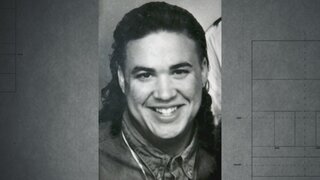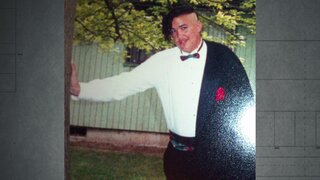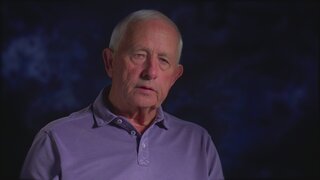‘She Was A Master Manipulator’: Anti-Gang Teen’s Murder Arranged By Fellow Activist Who Was Secretly A Gang Leader
Aaron Iturra was an activist who spoke out about gang violence, only to be betrayed by someone who pretended to have the same values that he did.
The life of a teenage anti-gang activist in Eugene, Oregon was cruelly taken from him in the fall of 1994, and the investigation into his murder revealed a stunning betrayal no one saw coming.
On the morning of October 3, 1994, a hysterical mother called 911 to report that her son had been gravely injured and was bleeding from the head. Upon their arrival, first responders found 18-year-old Aaron Iturra injured in bed but still breathing. Paramedics rushed him to the hospital, while officers began their investigation into the shooting.
Authorities quickly determined that someone had used a .38 caliber gun to shoot Aaron in the head, but although they were able to recover a piece of the bullet, the gun itself was nowhere to be found. There were no signs of a break-in and nothing of value had been taken. Plus, Aaron had been shot in the head, but he wasn’t alone in bed at the time of the shooting. A girl he’d been seeing had been sharing the bed with him at the time but was unharmed, setting off alarm bells for investigators.
“The fact that one person wasn’t shot and the other one was indicates that there’s a motive to single that person out,” Steve Skelton, an assistant D.A. in Lane County, told “An Unexpected Killer,” airing Fridays at 8/7c on Oxygen.
Police began their interviews with Aaron’s mother, Janyce Iturra, who explained that Aaron had gone into his room the night before with his girlfriend. It wasn’t until 1:30 a.m. that anything out of the ordinary happened: She heard screaming coming from Aaron’s room and when she rushed there, she found him bleeding from an apparent gash to the head as his girlfriend was “freaking out,” she told producers.
Aaron, the oldest of five children, was known to be kind and gentle, someone who often looked after his younger siblings while his mother worked two jobs to support the family. He was also an aspiring artist and an activist who spoke out often against gang violence in his community. He didn’t have any enemies that anyone knew of.
“He was the protector. He watched out for everybody,” Janyce recalled.
After a night in the hospital, Aaron, whose scans showed no brain activity, was taken off of life support. The police investigation into his shooting officially turned into a homicide case, and police spoke to his girlfriend. After testing her hands for gunpowder residue, they were able to rule her out as a suspect and she began recounting what happened before Aaron was shot.
She recalled that an unknown woman had called the house to ask if Aaron was home, and after receiving a yes, promptly hung up. She then described the shooting in more detail: She woke up after hearing a gunshot and believed that she saw two males with their faces covered with bandanas.
Police began to dig into the anti-gang activism that Aaron was doing, suspecting that he’d maybe made some dangerous enemies that way. They found that he’d been working often with another local activist named Mary Thompson, a mother known for speaking out about the harm gangs had done to her family and the community.
Two days after Aaron’s shooting, the completed autopsy revealed Aaron had died from a single gunshot wound to the back of the head. The community was desperate for answers, and Aaron’s mother was left to grieve the sudden death of her son. However, police soon came across new information that shed light on an unexpected relationship in Aaron’s life.
Aaron had been hanging out with a 16-year-old teen named Beau Flynn, who was actually Thompson's son: the same son whose gang activity had inspired her to get into anti-gang activism. Thompson had actually asked Aaron to keep a close watch on him and help him stay out of trouble. Unfortunately, not even Aaron’s influence could keep Flynn’s nose clean. Three weeks before the shooting, the two were hanging out together when they encountered another group of teens, one of whom had history with Flynn. An altercation ensued and Flynn pulled a knife on the other teen, cutting him — and landing both himself and Aaron in jail.
After that, Aaron decided to testify against Flynn in the case, which could potentially land Flynn a four-year sentence behind bars. Because Aaron was due to testify mere days before he was killed, police began to wonder if Flynn had something to do with Aaron’s death and went to visit him in the juvenile detention center where he was being held in connection to the assault case.
Flynn maintained his innocence, and because police had no evidence suggesting otherwise, they were forced to look elsewhere for suspects.
During the course of their investigation, investigators caught wind of two teens — Jim Elstad and Joseph Brown— bragging about being involved in Aaron’s murder. Elstad and Brown were known to spend a lot of time at Thompson's house, and Thompson often took in kids who were involved in violent lifestyles. But before police could seek out Elstad and Brown for an interview, Thompson reached out to police to say that not only had she heard the two boys were involved in Aaron’s death, but they’d actually come to her house the morning after the murder, seeking refuge. She admitted to keeping that bit of information from police, but claimed she’d done so because she hadn’t believed them at the time.
Elstad and Brown were called in for a police interview. While they initially maintained their innocence, they also failed their polygraph tests. Hours later, the pair both confessed: Brown was the lookout while Elstad was the one who pulled the trigger. They said they’d done because they were angry with Aaron for agreeing to testify against Flynn. They explained they threw the gun into a river afterward, and police were able to track it down.
Elstad and Brown were arrested in October and it seemed like the case was coming to a close. However, things took a strange turn after Aaron’s mother received a call from Thompson, who was close to the family and had been supporting them during this time. During that phone call, Thompson told Janyce that Aaron would never have been killed "if [he] had just kept his mouth shut," Janyce told producers.
“I’m just like, ‘Did I just hear her say what I think I heard her say?'” Janyce recalled.
Janyce reported the strange statement to police, who already had their suspicions about Thompson. They called her back in for questioning, intending to find out why she’d kept valuable information from them early in the investigation. But although Thompson admitted to being angry at Aaron for working with prosecutors, police had no evidence against her and were forced to let her go.
Still, they were not convinced of her innocence and began to dig more deeply into her past. They discovered that she had a troubled history. She’d been involved in criminal pursuits that included selling methamphetamine while she was actually working as an assistant to those prosecuting drug dealers.
“It was definitely shocking. She was a crime fighter in the community, trusted, and then had engaged in that kind of behavior,” Skelton said, adding later, “You never would have expected that.”
Police, suspecting Thompson may have actually been the one to orchestrate Aaron’s murder, began listening in to Flynn's conversations in the hopes of getting more info. While they initially believed Flynn was the gang leader, it quickly became clear it was actually his mother who’d been calling all the shots, orchestrating various crimes with practiced ease.
Even more shockingly, during another conversation among gang members, Thompson referenced having arranged Aaron’s murder while threatening someone else. They realized Thompson was actually a hardened criminal, rather than the concerned mother and community activist so many had believed she was.
They arrested the gang members, hoping at least one of them would be willing to turn against Thompson, and they got their wish: In exchange for immunity, one gang member, Lisa, spilled everything that she knew about Thompson, claiming that it was Thompson who’d influenced the boys to kill Aaron in order to protect her son.
“Mary Thompson was absolutely a master manipulator. That was demonstrated many, many times,” Skelton said.
Thompson was charged with aggravated homicide in February 1995. After pleading guilty to Aaron’s murder, Brown was sentenced to 10 years, while Elstad got 16 years. But Thompson, who pleaded not guilty, was convicted in 1996 and sentenced to life in prison. A legal loophole saw her sentence reduced, however, and she was released in the summer of 2019 after serving 23 years.
For more on this case and others like it, watch “An Unexpected Killer,” airing Fridays at 8/7c on Oxygen.




















